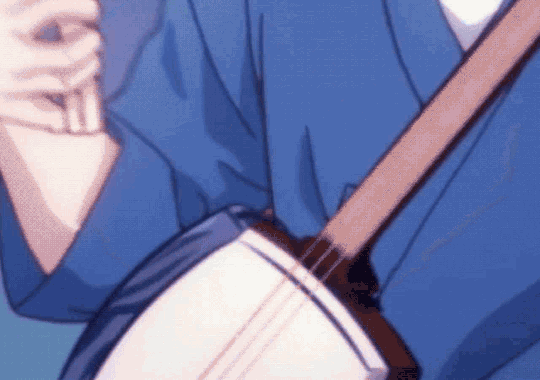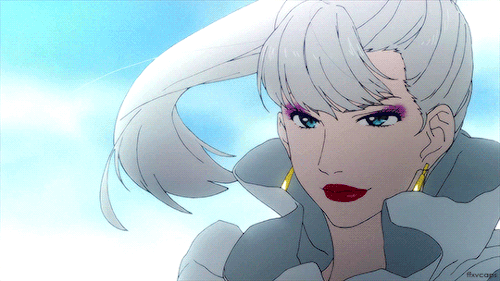Don't wanna be here? Send us removal request.
Text
Mashiro no Oto: When Competition Becomes Toxic
TRIGGER WARNING(Manipulative Parent) Competition Is a large part of most people’s lives. Whether you’re a student, entering an oversaturated job market, or even an artist you will likely face competition at some point in your life. And whether or not it means to, Mashiro no oto shines a light on some of the worst aspects of competition and how damaging it can be to individuals it hurts.

The show focuses on Setsu Sawamura, a high school shamisen player who is mourning the death of his grandfather and mentor, Matsugorou.Throughout the story Setsu grows both as a person and as a musician in various ways as he moves to tokyo and helps begin a shamisen club at his school. For a large portion of the series setsu is mourning his grandfather’s passing, making friends at school and learning to find his own sound, rather than just copy his grandfather’s. The main obstacles to his growth are his attachment to his grandfather, and his high-achieving, manipulative parents.

Setsu’s mother Umeko re-enters the fold when she realizes Setsu has the potential to revive and share the deceased master Matsugurou’s sound with the world. Matsugorou himself did not care for the world of professional musicians and competition, preferring to play for small groups in his home, and for himself in his old age rather than enter the spotlight and seek fame. Umeko can’t accept that he died with no one knowing his music and looks to Sawamura to fulfill that role. At first it appears Umeko is attempting to shake Setsu out of his depression, she finds him an apartment, and competes with his shamisen using her singing to force him to play with some emotion again. While they are playing Setsu reflects on the fact his mother hasn’t ever done anything for him before, and though he hates his mother, he admits her voice is amazing. This first encounter with Umeko however is very positive for Setsu, he starts going to highschool, he starts playing again, and stops wandering around aimlessly. While there are red flags present in the fact that Umeko has been established as an absentee mother, for the most part her actions so far could be read as those of a mother kicking their kid out of a loop of depression. At this point, Umeko retreats from Setsu’s life as he goes back to school and begins to move forward once again. While Setsu is learning to put his grandfather’s shadow to rest and meeting people who support what he wants, Umeko is setting up a highschool competition named after Setsu’s grandfather where she can unveil Setsu to the world. At first Setsu doesn’t care about the competition, but realizes it has the potential to help him grow further and help him discover his sound as a musician.
Unfortunately, while there are so many people supporting setsu, from his peers to his brother, to a professional shamisen player who has taken an interest in him, he hasn’t broken free of his grandfather’s shadow yet. So along comes the spider Umeko, during the competition she confronts Setsu and tries to convince him that Matsugorou’s sound is the sound everyone wants to hear, not his. This triggers Setsu and causes him to try his best at copying Matsugorou’s sound rather than playing his own that he’s developed for the first half of his performance. While he breaks through his haze and switches to his own style and still enthralls the audience, he still gives a performance split between two styles and ends up in third place, as opposed to fighting for first and truly leaving his grandfather behind. After the competition, Umeko pushes him over the edge by telling him that he’s an embarrassment and destroying the third place trophy he was to receive. Other prominent musicians consult him afterwards and tell him why he failed, and go so far as to say this is an inherent flaw in his person. While this feels like a narrative push to give Setsu resolve, it is important to note that Setsu is clearly recovering from a large amount of grief and depression. A large supporting pillar of his personality was knocked out, and he is in the process of rebuilding. This competition, which should have served to help him finish that process, instead serves to set him back and traumatize him further.
While Umeko certainly receives a lot of the blame for manipulating Setsu, it is important to note that competitions often result in large amounts of pressure and stress due to the value we attach to winning and the prizes we associate with it. Everyone has expectations to fulfill, and everyone has mental health problems they are working on to varying degrees. At their best competitions can serve as a place of learning which motivates all involved, however at their worst they can serve to inflame one’s mental health and set unrealistic expectations for oneself and others leading to injury and self destructive behaviour.
As for Setsu, I’m sure in later seasons he will recover and continue to grow despite this setback and eventually be able to overcome his mother’s toxic influence, but this is just a story after all. For many the first season of Mashiro no Oto could be how someone’s mental health takes a nosedive. It is important to acknowledge both Umeko’s and her competition’s influence on Setsu’s mental health as negative. You could make the argument that Umeko is the only toxic element here, but Umeko is largely characterized by her obsession and competitiveness. Wherever you see competition, people with these traits are rarely far.
Why do we see desperation, obsession, broken competitors, and mental illness often so associated with competition? It shouldn’t be surprising as competition is born out of scarcity. For some it’s the spotlight, for others it is the means to continue doing what they love, and for others still, it’s about a means to survive or help others. These by themselves are noble causes, the problem is scarcity. When everyone can’t have the outcome they want, we fight for it and we actively create that environment with competitions. We push ourselves too far, we lose sight of ourselves, we start seeing other people as tools to be manipulated, we start trying to solve the problem of winning and living up to unreasonable expectations rather than just focusing on our own self improvement. Truthfully, if Umeko’s goal was to support the young artists of tomorrow and secure a future for shamisen and the spirit of Matsugorou’s style, an over the top competition in Matsugorou’s name is perhaps not the most effective way to do it. Even if she just wanted to support her son, the cost of that competition must have cost at least a few decades worth of living expenses she could have spent on him. What Umeko wanted wasn’t what Matsugorou wanted, if it was the old man could have done it a long time ago. Umeko wants her son to be hyper-successful at any cost and she doesn’t understand Matsugorou’s spirit or what will make Setsu a better player or a happier person. Her goal is simply for Setsu to win the competition and succeed without regard for him as a person. Competitions rarely take place if they aren’t funded by massive sums of money, as Umeko herself proclaims. This money could just as easily be used to fund boarding houses and schools for young artists, but the competition was made for Umeko’s goal of proving her son is the best. Competitions in life are often more about entertainment and advertising, rather than improving the lives of the people who give us the entertainment in the first place. Rather than work toward a post-scarcity environment, competitions revel in the scarcity and should it disappear, so would the competitions. The conceit of competitions as observed by the average person is that competitions bring out the best in us and push us to succeed. In reality they are designed to push people out and manipulate people to provide what others want them to until they break. I, for one, think Setsu’s sound would be better without Umeko’s competition as he could continue to grow his own sound, and play for the people who want to hear him, and not his grandfather’s shadow.
17 notes
·
View notes